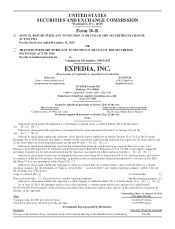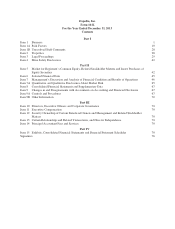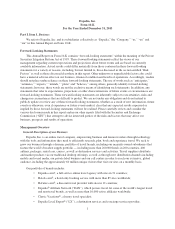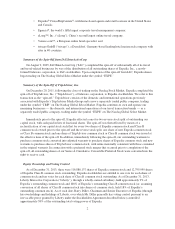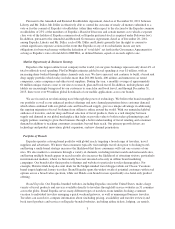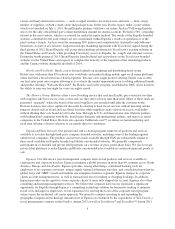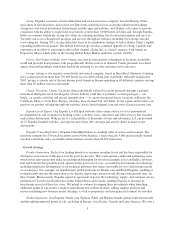Expedia 2013 Annual Report Download - page 12
Download and view the complete annual report
Please find page 12 of the 2013 Expedia annual report below. You can navigate through the pages in the report by either clicking on the pages listed below, or by using the keyword search tool below to find specific information within the annual report.majority share of eLong, which is the second largest online travel company in China. We also own Venere, a
European brand, which focuses on marketing hotel rooms in Europe. Egencia, our corporate travel business,
operates in more than 60 countries around the world and continues to expand, including its 2012 acquisition of
VIA Travel. We also partner in a 50/50 joint venture with AirAsia — a low cost carrier serving the Asia-Pacific
region — to jointly grow an online travel agency business. Although the results for the joint venture are not
consolidated in our financial statements, we consider this business to be a key part of our Asia Pacific strategy. In
2013, approximately 44% of our worldwide gross bookings and 47% of worldwide revenue were international
points of sale up from 22% for both worldwide gross bookings and revenue in 2005. We have a stated goal of
driving more than half of our revenue through international points of sale.
During March 2013, we completed our majority acquisition of trivago, a leading hotel metasearch company.
Officially launched in 2005, trivago is already one of the best known travel brands in Europe. trivago will
continue to operate independently, and plans to rapidly grow revenue through global expansion, including
aggressive expansion into the United States and Canada.
In expanding our global reach, we leverage significant investments in technology, operations, brand
building, supplier relationships and other initiatives that we have made since the launch of Expedia.com in 1996.
Our scale of operations enhances the value of technology innovations we introduce on behalf of our travelers and
suppliers. We believe that our size and scale affords the company the ability to negotiate competitive rates with
our supply partners, provide breadth of choice and travel deals to our traveling customers through an increasingly
larger supply portfolio and creates opportunities for new value added offers for our customers such as our loyalty
programs. The size of Expedia’s worldwide traveler base makes our sites an increasingly appealing channel for
travel suppliers to reach customers. In addition, the sheer size of our user base and search query volume allows
us to test new technology very quickly in order to determine which innovations are most likely to improve the
travel research and booking process, and then roll those features out to our worldwide audience in order to drive
improvements to conversion.
New Channel Penetration. Today, the vast majority of online travel bookings are generated through typical
desktop and laptop computers. However, technological innovations and developments are creating new
opportunities including travel bookings made through mobile devices. In the past few years, each of our brands
made significant progress creating new mobile websites and mobile/tablet applications that are receiving strong
reviews and solid download trends. We believe mobile bookings via smartphones present an opportunity for
incremental growth as they are typically completed within one or two days of the travel or stay which is a much
shorter booking window than we have historically experienced via more traditional online booking methods.
During the last year, customers’ behaviors and preferences on tablet devices began to show differences from
trends seen on smartphones. For example, the booking window on a smartphone typically is much shorter than
the emerging trend on the tablet device and historical average on a desktop or laptop. We also believe mobile will
represent an efficient marketing channel given the opportunity for direct traffic acquisition and repeat customers,
particularly through mobile applications. We have a stated goal of booking 20% of our transactions through
mobile devices before the end of 2014.
Merchant and Agency Business Models
We make travel products and services available both on a stand-alone and package basis, primarily through
two business models: the merchant model and the agency model. Under both models, we facilitate the booking of
hotel rooms, airline seats, car rentals and destination services from our travel suppliers. Under the merchant
model, we are the merchant of record. Under the agency model, the travel supplier is the merchant of record.
During 2012, we introduced the Expedia Traveler Preference (“ETP”) program that enables much closer
integration of the agency hotel product with our core merchant offering. Specifically, for participating hotels, we
will be able to offer customers the choice of whether to pay Expedia in advance (Expedia Collect) or pay at the
hotel at the time of the stay (Hotel Collect).
For transactions where we act as merchant of record, we generally have certain latitude to establish prices
charged to travelers (as compared to agency transactions). Also, we generally negotiate supply allocation and
6



